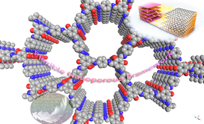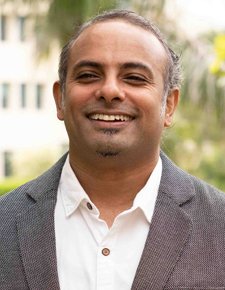Professor Ramanathan Vaidhyanathan
Special Seminar
Professor Ramanathan Vaidhyanathan
Department of Chemistry
Indian Institute of Science Education and Research Pune
Covalent Organic Frameworks as Platform for Charge-storage
Covalent Organic Framework (COF) as crystalline organic polymer has rapidly surged since 2005. The modular framework of COF offers room for by-design functional manipulation in an application-specific manner. Their lightweight nature, high surface area, and processability have signified them as a potential candidate for many charge-storage systems. Large micro-mesopores favor rapid diffusion of charged ions, which is guided by the intrinsic electronics of the conjugated framework. Unfortunately, in many cases, due to the inherent defects in the framework, the conjugation does not propagate sufficiently, leading to poor conductivity. To substitute this, conducting carbons are typically added to boost their conductivity, enhancing their charge storage properties. Here we embrace a different approach to achieving this. Our versatile strategy yields a carbon-free conducting COF displaying substantially high energy and power density in a supercapacitor configuration. This presentation will brief our approach and findings.

Ramanathan Vaidhyanathan
Dr. R. Vaidhyanathan obtained his Ph.D. from the Jawaharlal Nehru Centre for Advanced Scientific Research under Prof. C. N. R. Rao and Prof. S. Natarajan. He worked as a postdoc with Prof. M. J. Rosseinsky at the University of Liverpool and as a research associate with Prof. George Shimizu at the University of Calgary. He started his independent research career as an assistant professor in IISER Pune in 2012. Currently, he is an Associate Professor at IISER Pune. His research focuses on developing Advanced Porous Materials such as metal-organic frameworks (MOFs) and covalent-organic frameworks (COFs) and their nanocomposites for environmental and energy applications. He has published over 101 papers and has 11 patents filed from IISER Pune. He has been rewarded with several honors, including the C.N.R. Rao Award. National Prize for research in Physical and Inorganic Chemistry (2021), Materials Research Society of India Medal (2019). He serves as an Editorial Board Member of ACS Materials Letters and Nature Scientific Reports. He is an Associate Editor of ACS Chemistry of Materials.
Relevant publications:
- Exceptional Capacitance Enhancement of a Non‐Conducting COF through Potential‐Driven Chemical Modulation by Redox Electrolyte, Kushwaha R, Haldar S, Shekhar P, Krishnan A, Jayeeta S, Hui P, Vinod CP, Subramaniam C, Vaidhyanathan R, Adv. Energy Mater., 11, 2003626 (2021).
- Facile Exfoliation of Single-Crystalline Copper Alkylphosphates to Single-Layer Nanosheets and Enhanced Supercapacitance, Bhat GA, Haldar S, Verma S, Chakraborty D, Vaidhyanathan R, Murugavel R, Angew. Chem. Int. Ed., 58,16844–16849 (2019).
- Tuning the electronic energy level of covalent organic frameworks for crafting high-rate Na-ion battery anode, Haldar S, Kaleeswaran D, Rase D, Roy K, Ogale S, Vaidhyanathan R, Nanoscale Horiz., 5, 1264-1273 (2020).
- Chemical Exfoliation as a Controlled Route to Enhance the Anodic Performance of COF in LIB, Haldar S, Roy K, Kushwaha R, Ogale S, Vaidhyanathan R, Adv. Energy. Mater., 9, 1902428 (2019).
- Pyridine-Rich Covalent Organic Frameworks as High-Performance Solid-State Supercapacitors, Haldar S, Kushwaha R, Maity R, Vaidhyanathan R, ACS Materials Lett., 4, 490–497 (2019).
- 6High and Reversible Lithium Ion Storage in Self-Exfoliated Triazole-Triformyl Phloroglucinol based Covalent Organic Nanosheets, Haldar S, Roy K, Nandi S, Chakraborty D, Puthusseri D, Gawli Y, Ogale S, Vaidhyanathan R, Adv. Energy Mater., 8, 1702170 (2018).
